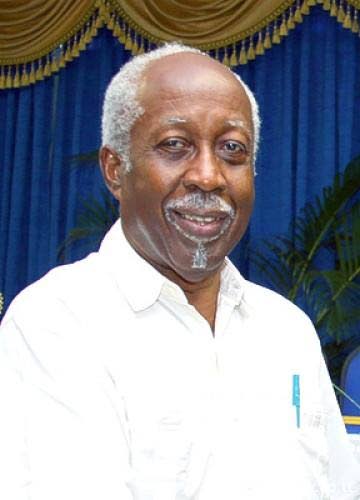The Monroe/Roosevelt Doctrines

Reginald Dumas
US President James Monroe’s message of December 2, 1823 to the US Congress covered a wide range of subjects. Among other things, it included the assertion that “instructions have been given to all the ministers of the US accredited to the powers of Europe and America” (by “America” he meant the western hemisphere) “to propose the proscription of the African slave trade by classing it under the denomination, and inflicting on its perpetrators the punishment, of piracy.”
In this connection, did you know that the capital of Liberia is named after him?
But Monroe also said this: “(The US) should consider any attempt on (the part of European powers) to extend their system to any portion of this hemisphere as dangerous to our peace and safety…(W)e could not view any interposition for the purpose of oppressing (independent governments of the hemisphere), or controlling in any other manner their destiny, by any European power, in any other light than as the manifestation of an unfriendly disposition towards the US.”
It's an edict, called a “doctrine,” that has become notorious in this part of the world.
Yes, Monroe’s remarks focused on US reaction to any moves by a European country to assert hegemony over its former colony or colonies, now politically independent, in this hemisphere – Portugal over Brazil, for instance, or Spain over Chile or Argentina. (He made it clear he wasn’t referring to “existing colonies or dependencies of any European power.”)
But US exceptionalism was already alive and well, and unofficial interpretation of Monroe’s words quickly expanded his boundaries. By the 1840s the US was exalting its “Manifest Destiny” creed, according to which expansionism was God’s plan for the country. Poor God hadn’t uttered a word.
In his message to the US Congress of December 6, 1904, President Theodore Roosevelt accepted his nation’s “adherence…to the Monroe Doctrine…”
But he went further: he officially endorsed the unofficial enlargement of the doctrine.
He said: “We would interfere (with our southern neighbors) only in the last resort, and then only if it became evident that their inability or unwillingness to do justice at home and abroad had violated the rights of the US or had invited foreign aggression to the detriment of the entire body of American nations.”
It was now not only a question of external European meddling à la Monroe. It was now also, officially, the internal, domestic behaviour of hemispheric states which could invite US “interference.” It’s known as the “Roosevelt Corollary” to the Monroe Doctrine. But it’s really a new doctrine, and is the kind of intervention we’ve come to know.
In early 1933 Franklin Roosevelt, Theodore’s cousin, became president and announced a US “Good Neighbor” policy for the hemisphere. Within the framework of that policy, his Secretary of State, Cordell Hull, told a Montevideo conference in December 1933 that “under (his government’s) support of the general principle of non-intervention…no government need fear any intervention on the part of the US…”
His listeners must have been extremely sceptical, seeing that his “assurance” was coming after US interventions in Cuba, Honduras, Nicaragua, Mexico, Haiti, Argentina, etc. A further, deeper, bite of Cuba, a coyly-named “rescue mission” in Grenada, invasions of the Dominican Republic and Panama, and so on were yet to come.
Eight decades after Hull, in November 2013, John Kerry, then President Barack Obama’s Secretary of State, would affirm to the OAS that the “era of the Monroe Doctrine is over.” (Not in 1933, apparently.)
Except that it wasn’t over. A few years later, Rex Tillerson, Donald Trump’s Secretary of State at the time, described the doctrine as “clearly…a success…I think it’s as relevant today as it was the day it was written.”
What does Anthony Blinken say? What would he do if Venezuela entered Guyana waters and disturbed US oil interests? (And what would become of Caricom’s self-description as a “zone of peace”?)
December 2 this year will mark the 200th anniversary of the Monroe Doctrine; December 6 the 119th of the Theodore Roosevelt’s new doctrine, based on Monroe.
Unfortunately, the hemisphere continues in a state of disequilibrium – social, economic, ideological, racial, political. It’s more than time to step back and evaluate.
I suggest that, in the interest of improved understanding, relations and conduct, the OAS hold an analytical conference or seminar on our situation, with reference to the roles played by the two doctrines. The confrontations, which are likely to escalate, have gone on long enough, greatly to the detriment of millions of the hemisphere’s people, who aren’t as afflicted as are their leaders by considerations of ideological rectitude and power and control.
What is to be their destiny?

Comments
"The Monroe/Roosevelt Doctrines"